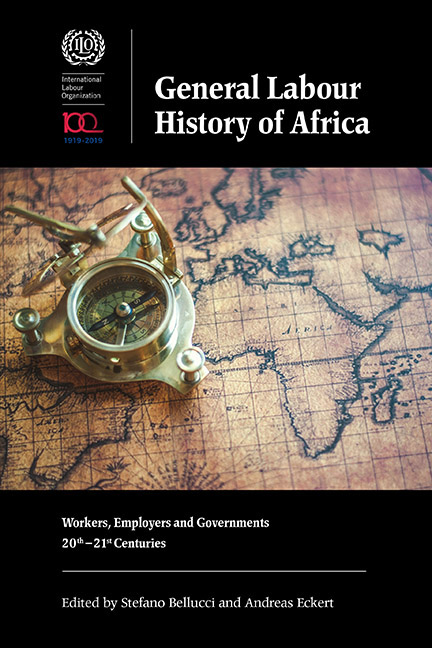Book contents
- Frontmatter
- Contents
- List of Maps and Figures
- List of Tables
- Notes on Contributors
- Foreword
- Acknowledgements
- The ‘Labour Question’ in Africanist Historiography
- Part I Free and Unfree Labour
- Part II Key Sectors
- Part III International Dimensions and Mobility
- Part IV Varieties of Work
- Part V Entrepreneurs and Self-Employment
- Part VI The State, Unions and Welfare
- Part VII Conclusions
- Select Bibliography
- Index
Foreword
Published online by Cambridge University Press: 21 September 2019
- Frontmatter
- Contents
- List of Maps and Figures
- List of Tables
- Notes on Contributors
- Foreword
- Acknowledgements
- The ‘Labour Question’ in Africanist Historiography
- Part I Free and Unfree Labour
- Part II Key Sectors
- Part III International Dimensions and Mobility
- Part IV Varieties of Work
- Part V Entrepreneurs and Self-Employment
- Part VI The State, Unions and Welfare
- Part VII Conclusions
- Select Bibliography
- Index
Summary
The General Labour History of Africa tells the story of African labour. It is an exposition of how African labour has evolved in different phases of contemporary history. At the time of the Treaty of Versailles, which spurred the creation of the International Labour Organization in 1919, the general motivation of a number of players was the stern belief that ‘Universal and lasting peace can be accomplished only if it is based on social justice.’ Since 1919 the ILO has continued to work to promote social justice, and has improved working conditions, workers’ rights and employment creation.
The journey has been turbulent at times. The twentieth century witnessed not only the wrath of two world wars, but also the Great Depression and its associated soaring unemployment and impoverished work conditions. But the complete history of labour needs to be told. While attempts have been made to create a truly global history of labour, the African component has largely been missed. This volume is an immense contribution to filling this gap. It surveys the historical development of African labour, giving the relevant timelines and charting the salient themes. It could not have come at a better time, for the ILO celebrates its centenary in 2019. The volume is a unique contribution to this celebration from an African perspective, as it presents the continent's history and gives it a significantly African voice. This is the first such volume to bring together critical inputs from world-renowned historians and labour experts discussing the evolution of African labour in a focused approach that analyses the issues in a simple but assertive manner.
The volume comes at a crucial time indeed. More than ever before, the significance of labour dynamics has been highlighted and labour issues recognized as the glue of development policy. African economic growth, which has recently been largely jobless, has sparked ever more thoughtful discourse on the social fabric, which is necessary to cushion the effects of growth that does not trickle down to the masses. This is also the time when, led by the United Nations, the world is devoting its resources to support the 2030 Agenda for Sustainable Development.
- Type
- Chapter
- Information
- General Labour History of AfricaWorkers, Employers and Governments, 20th-21st Centuries, pp. xv - xviiPublisher: Boydell & BrewerPrint publication year: 2019



